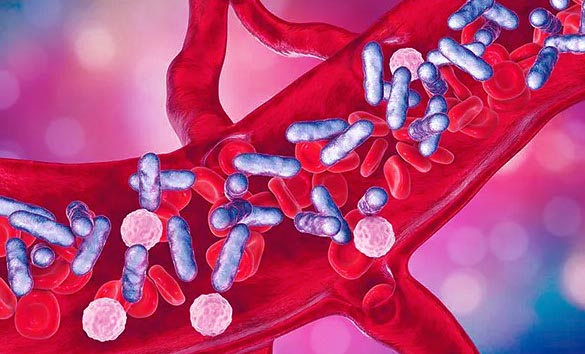Nikhil Prasad Fact checked by:Thailand Medical News Team Aug 10, 2024 1 year, 4 months, 2 weeks, 2 days, 20 hours, 59 minutes ago
Sepsis News: Sepsis-induced acute lung injury (ALI) is a severe condition affecting many patients in intensive care units worldwide. This life-threatening situation often leads to acute respiratory distress syndrome (ARDS), making it a significant cause of death among sepsis patients. This
Sepsis News report will delve into a recent study that sheds light on the intricate mechanisms of cell death involved in sepsis-induced ALI and explores potential treatment strategies.
 New hope for sepsis-induced lung injury
New hope for sepsis-induced lung injury
Researchers from the Department of Anesthesiology at The Affiliated Hospital, Southwest Medical University, Luzhou, China, have made groundbreaking discoveries on how certain types of cell death contribute to sepsis-induced ALI. Their study findings offer new perspectives on the treatment of this critical condition.
The Complexity of Cell Death in Sepsis
Sepsis triggers an overwhelming immune response to infection, leading to widespread inflammation and organ dysfunction. The lungs, being highly susceptible, are often the first to suffer. The study focuses on three specific types of cell death: autophagy, ferroptosis, and pyroptosis, each playing a unique role in the progression of ALI.
Autophagy: The Self-Eating Process
Autophagy is a process where cells degrade and recycle their components. Initially considered a survival mechanism, excessive autophagy can lead to cell death. The study reveals that autophagy levels increase in the early stages of sepsis, helping to manage localized damage. However, as sepsis progresses, autophagy is inhibited, leading to uncontrolled inflammation and lung injury.
Key signaling pathways such as AMPK/mTOR and PI3K/Akt/mTOR are involved in regulating autophagy. Drugs like ketamine and sevoflurane have shown potential in modulating these pathways to protect against sepsis-induced ALI.
Ferroptosis: Iron-Dependent Cell Death
Ferroptosis is a form of cell death driven by iron accumulation and lipid peroxidation. The study identifies the P53 signaling pathway as a critical regulator of ferroptosis. Proteins like SLC7A11, which promote antioxidant defenses, can be manipulated to control ferroptosis and protect lung cells.
Researchers also highlight the role of the ACSL4 and Nrf2 signaling pathways in ferroptosis. For instance, uridine supplementation was found to reduce ferroptosis by modulating ACSL4 expression, providing a potential therapeutic approach for sepsis-induced ALI.
Pyroptosis: Inflammatory Cell Death
Pyroptosis is a highly inflammatory form of cell death characterized by cell swelling and rupture, releasing inflammatory mediators. The study emphasizes the importance of the NF-κB pathway in regulating pyroptosis. This pathway is crucial in the immune response, and its activation leads to the formation of the NLRP3 inflammasome, a protein complex that triggers pyroptosis.
Inhibiting pyroptosis through the NF-κB pathway has shown prom
ise in reducing lung inflammation and damage. Substances like heat shock factor 1 and erythropoietin have been identified as potential inhibitors, offering new hope for treating sepsis-induced ALI.
Key Findings and Implications
The research underscores the intricate balance required to manage cell death processes in sepsis-induced ALI. By understanding how autophagy, ferroptosis, and pyroptosis contribute to lung injury, scientists can develop targeted therapies to mitigate these effects.
Autophagy Regulation:
-AMPK/mTOR Pathway: Activation of AMPK protects against lung injury by promoting autophagy.
-PI3K/Akt/mTOR Pathway: Drugs like ketamine inhibit late-stage autophagy, reducing inflammation and cell death.
Ferroptosis Control:
P53 Pathway: Modulating proteins like SLC7A11 can enhance antioxidant defenses and prevent cell death.
-ACSL4 and Nrf2 Pathways: Substances like uridine and itaconate show promise in reducing ferroptosis through these pathways.
Pyroptosis Inhibition:
NF-κB Pathway: Targeting this pathway can reduce inflammatory cell death, with potential treatments including heat shock factor 1 and erythropoietin.
Conclusion
The study's findings offer a deeper understanding of the mechanisms driving sepsis-induced ALI and open up new avenues for treatment. By targeting specific pathways involved in autophagy, ferroptosis, and pyroptosis, it is possible to develop therapies that can better manage this critical condition.
The study findings were published in the peer-reviewed journal: Frontiers in Pharmacology.
https://www.frontiersin.org/journals/pharmacology/articles/10.3389/fphar.2024.1415145/full
For the latest
Sepsis News, keep on logging to Thailand Medical News.
Read Also:
https://www.thailandmedical.news/news/moxifloxacin-shows-promise-in-protecting-against-severe-sepsis
https://www.thailandmedical.news/news/phytochemicals-as-potential-saviors-against-covid-19-associated-sepsis
